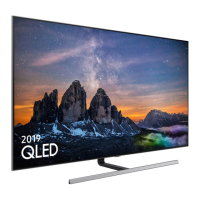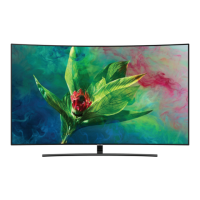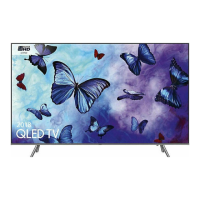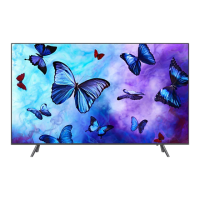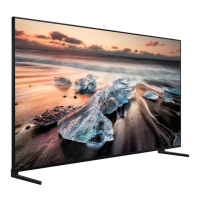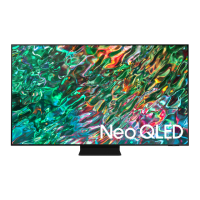Do you have a question about the Samsung QN55LS01RAF and is the answer not in the manual?
Details safety, servicing, and ESD precautions to prevent damage and hazards like electrical shock.
Information on electrical/mechanical parts with special safety characteristics identified by symbols on schematics.
Precautions for servicing units, including capacitor polarity, circuit board modification, and equipment handling.
Techniques to reduce component damage from static electricity (ESD), including grounding and handling procedures.
Safety measures for product installation, including carrying, cord placement, ventilation, and antenna positioning.
Visual details of the QN55LS01RAF model, including front and detail views, and color options.
Dimensions, weight, resolution, sound output, and environmental operating conditions for the QN55LS01RAF model.
Detailed specifications covering general info, display, video, audio, and smart service features of the QN55LS01RAFXZA model.
Specifications for convergence, connectivity, design elements, and additional features of the QN55LS01RAFXZA model.
Details on eco features and power consumption (max, standby, typical) for the QN55LS01RAFXZA model.
Lists included accessories like remote, batteries, manual, and cables, with their respective part codes.
Visual guide on how to arrange cables using the provided cable guide when installing the TV without a stand.
Diagram showing the rear panel connections, including USB, HDD, OPTICAL, ARC, HDMI, and ANT IN ports.
Focuses on The Serif's iconic design and 100% Color Volume feature using Quantum Dot technology.
Details Ambient Mode functionality and The Serif's design for aesthetic integration into living spaces.
Covers the metal floor stand, exclusive Ambient Mode patterns, and neat power cable management.
Step-by-step guide on connecting a mobile device to The Serif TV using NFC for content streaming.
Explains how to use Samsung Bixby for voice control of the TV, including commands and activation.
Instructions for pairing the Samsung Smart Remote with the TV, including manual pairing steps.
Details on Smart Hub features like Notification, Settings, Source selection, Search, and APPS.
Explains how to enter Ambient Mode and use the Universal Guide for content discovery and recommendations.
Details on the Ambient Mode browser screen, content preview, and how to select categories.
Covers Ambient Mode settings like Auto Brightness, Sleep After, and content categories (Décor, Info, Photo).
Explains how to access and use the Shortcuts menu for quick access to sources and channels.
Details on initiating Bixby via voice commands and using Samsung Smart Remote buttons for interaction.
Guide to the Explore Bixby screen, covering My Profile, Bixby settings (Language, Voice Response), and Recommended Commands.
Information on learning Bixby voice commands via 'All Services' and viewing tutorials.
Step-by-step guide to using NFC on TV for streaming music and content from a mobile device.
Details the functions of each button on the Samsung Smart Remote, including power, navigation, and special keys.
Instructions for pairing the TV with the smart remote and installing batteries correctly.
Guide on operating the TV using the physical TV Controller button for menu navigation and selection.
Lists supported subtitle formats, video formats with subtitles, and image formats with resolutions.
Details supported music formats, codecs, video/audio decoder capabilities, and general restrictions.
Instructions for safely positioning the TV and removing the stands during disassembly.
Steps for removing the back cover and bottom stand bracket, including screw details.
Guidance on using an open jig to detach the rear cover and disconnect cables.
Steps for removing the Network-WLAN client, Function board, and speaker assembly.
Instructions for removing the main PCB and the DC VSS-PD board.
Steps for removing the SMPS board and completing the disassembly process.
Procedure for testing function control, including LED status, key input, and IR operation checks.
Steps to test TV power standby, checking LED indicator, AC line, and SMPS fuse.
Procedure to test the TV power-on sequence, checking voltages and components like SMPS and Main Board.
Steps for testing backlight functionality, including activating backlights and checking panel sections.
Troubleshooting steps for backlight dimming issues, including menu adjustments and a backlight test.
Troubleshooting customer picture issues by testing the Main/T-CON board with picture tests.
Guide to using factory mode to check various test patterns like Scaler, FRC, and SoC TCON patterns.
Troubleshooting video issues by testing Main Section and Pre FRC Section, checking sources and cables.
Troubleshooting video issues in Post FRC and T-CON sections, checking for noise and replacing boards if needed.
Procedure to check for noisy video and identify a defective panel.
Troubleshooting audio problems related to TV source, speakers, optical output, HDMI, and Bluetooth.
Diagnosing TV to router and router to network connection failures, checking MAC addresses and network status.
Troubleshooting Smart Hub connectivity problems related to network, DNS, ISP, server, and app loading.
Troubleshooting Netflix operation and streaming problems, including certificate checks and speed tests.
Pin description for the BT/WiFi module and troubleshooting steps for MAC address or signal issues.
Steps for replacing the main board, including entering factory menu and setting values like Type, Writing Type, and Model Code.
Details on setting the Writing Type and Local Set parameters during main board replacement.
Instructions for configuring the SW Model parameter during main board replacement using label information.
Steps for correctly entering the Model Code during main board replacement to ensure proper functionality.
Procedures for entering factory mode using remotes and performing factory reset.
Details on setting option bytes, performing factory reset, and understanding the factory mode initial screen.
Explains how to run and verify various test patterns within the SVC menu for troubleshooting.
Guide to checking the ER Count screen for hardware and software error status.
Procedure for configuring EDID settings, including enabling EDID and writing all data.
Instructions for entering factory mode using consumer or factory remotes.
Detailed factory options for Panel, SMPS, Main information, and factory/PBA options.
Lists factory data parameters for Option and Control menus, including EDID, Sub Option, and RS-232 Jack settings.
Details advanced factory menu items and Hotel Option settings.
Covers Shop Option, Asia Option, and Sound settings with parameters like Carrier_Mute and Pilot Level.
Lists factory settings for Speaker EQ, Debug menu, and Spread Spectrum parameters.
Details advanced factory parameters, RF Mute Time, Tuner Margin, and FRC settings.
Lists factory settings for TCON, SerDES Tuner, HDMI, and Stress Mode diagnostics.
Covers CES options, BT throughput, DB download, and SVC test menus.
Lists factory settings related to HDMI timing, mute, HDCP, and DVB CI parameters.
Details factory settings for test patterns and various upgrade procedures for TV components.
Covers other factory settings and sections related to ADC/WB calibration.
Details ADC results and White Balance settings within the factory menu.
Lists gain settings for various color channels and SPI White Balance configurations.
Covers advanced SPI settings including gain, offset, and WB data transfer.
AV control commands for power, volume, source selection, and picture modes.
AV control commands for picture settings like Backlight, Contrast, Brightness, Sharpness, Color, Tint, and Advanced Settings.
AV control commands for Color Space, LED Motion Plus, Noise Filters, and HDMI Black Level.
AV control commands for Film Mode, Motion Plus, Screen Adjustment, and Picture Size.
AV control commands for 3D settings, Reset Picture, Factory-SVB, and applying picture modes.
AV control commands for Pip, Sound Mode, Equalizer, SRS settings, Language, and Sound selection.
AV control commands for TV installation type, audio delay, key generation, OSD, and status retrieval.
Instructions for updating TV software via the internet, USB, or automatically.
Block diagram illustrating connections between TV Board, SMPS, WiFi, NFC, IR, and Speaker.
Details specific cables used for connecting SMPS to Main Board, FFC cables, and connector sub assemblies.
Details connector sub assemblies for Combo, Function, and NFC connections, including part numbers.
Pin map and details for connectors on the Main Board, including USB, Optical, HDMI, EX-LINK, Function/IR, BT/WIFI, NFC, and Power.
Detailed pin assignments for HDMI inputs (IN1, IN2, IN3, IN4), EX-LINK, NFC, Function/IR, and BT/WIFI connectors.
Pin assignments for Amplifier (ACN01_14P) and Power (CN201_NQ70) connectors on the Main Board.
Detailed pin assignments for the CN1301_UT (USI-T RIGHT) connector on the Main Board.
Detailed pin assignments for the CN1300 (USI-T LEFT) connector on the Main Board.
Pin map for the SMPS board's main connector (CNM801), detailing power and control signals.

